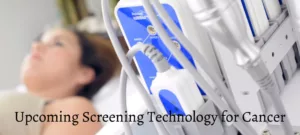Cancer is a worldwide problem affecting all age groups of the population with no respect to race or health status. Most deaths from cancer have been due to late detection hence the need for better technology to help in early detection and timely treatment.
Analysing Blood Protein Abnormality
It is now possible to detect colon cancer in the early stages by analysing abnormalities in blood proteins. Research has shown that cancer causes these abnormalities, but there has never been a test sensitive enough to detect this.
This is expected to catch most of the cancers at an early stage, especially pancreatic cancer, which has shown a very low survival rate. Cancer patients now have a hope of life after cancer with early detection that significantly increases the prognosis.
Smartphone-Sized Dna Analyzer
A startup known as QuantuMDx has invented a revolutionary device that can analyze DNA to detect any changes. The size is so small, and it is low cost for easy access by the public. The handheld lab can accurately diagnose gastro issues, colon cancer, and other cancers, among other common diseases in minutes.
The manufacturer hopes to release it to the doctors as early as the beginning of 2018. The device runs on solar powered battery or winding up and is designed to read biological samples using micro-fluidic technology.
Virtual Colonoscopy
There is no better way to diagnose colon cancer and gastro conditions than using virtual technology. This clinically advanced diagnostic equipment has shown improvements in detecting colorectal cancer early, therefore preventing many deaths.
Virtual colonoscopy is a form of CT scan that uses low radiation doses to scan the colon to detect masses and polyps. Its main advantage is the minimal invasion compared to optical colonoscopy. There is no need for sedation and it can be performed in minutes allowing the patient to return to work. This technique has undergone years of development and has been proven to be reliable in early detection of colon cancer.
Blood Test for Colon Cancer
Researchers in Canada have found molecular traces of precancerous polyps in the blood, a key warning sign of colon cancer. The results of this study were published in the Journal of Biomedical Optics Express and are on the way to providing a cheaper and minimally invasive initial cancer screening option. This could complement colonoscopy when it has been approved as a routine.
Detecting polyps before they become cancerous is the best way to prevent cancer deaths. This test is available to everyone and is not as uncomfortable as colonoscopy. This will encourage more people to get tested instead of waiting till things get out of hand. For example, the fecal occult blood test can be used comfortably at home to look for any evidence of blood in the stool at a microscopic level which a potential sign of cancer. Since many early stage colon cancers have no symptoms and do not bleed, they may go undetected using this method.
This test will not replace colonoscopy. However, it can detect cancer in very early stages resulting in a timely start in the treatment process. This could be used as a first line test before a further test is done when the warning signs are detected.








